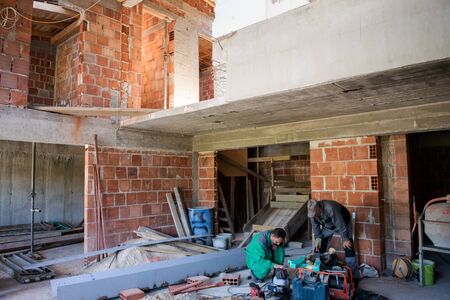Introduction to the Party Wall Act
The Party Wall Act 1996 is a crucial piece of legislation governing building works that affect shared walls or boundaries between properties in England and Wales. Its primary aim is to prevent and resolve disputes between neighbours when construction, renovation, or repair works are planned near or on a party wall, party structure, or boundary line. Whether you’re planning an extension, loft conversion, or underpinning, compliance with the Party Wall Act ensures that both property owners’ rights are protected and that any potential disagreements are managed within a clear legal framework. Failing to adhere to the requirements of the Act can lead to unnecessary conflicts, delays, and significant financial consequences. Understanding why this law exists—and recognising its role in safeguarding harmonious neighbourly relations—should be the first step for anyone undertaking property development or structural alterations within England and Wales.
2. Common Construction Scenarios Where the Party Wall Act Applies
The Party Wall Act 1996 is a crucial piece of legislation in the UK, particularly for homeowners and property developers undertaking works that could affect shared boundaries or structures. Ignoring its requirements can result in serious legal and financial consequences, so understanding when the Act applies is vital. Here are some typical construction scenarios where compliance with the Party Wall Act is essential:
Loft Conversions
Many property owners seek to maximise their living space through loft conversions. However, this often involves structural alterations to party walls, such as inserting steel beams or raising the roofline. In these cases, serving notice under the Party Wall Act to adjoining owners is a legal necessity. Failing to do so can lead to disputes, enforced work stoppages, or even court action.
Extensions
Building an extension—whether single or double storey—frequently involves work on or near a boundary line. This includes digging foundations within three or six metres of a neighbouring structure, which triggers the Act’s requirements. Properly following procedures ensures both parties’ interests are protected and reduces the risk of costly delays.
Structural Repairs
Repairs to party walls themselves, such as fixing cracks, damp issues, or underpinning foundations, also fall within the scope of the Act. Even seemingly minor works may require formal notification and agreement from neighbours to prevent future liability claims.
Typical Building Works Requiring Party Wall Procedures
| Type of Work | Party Wall Act Required? | Potential Risks if Ignored |
|---|---|---|
| Loft Conversion (steel beam insertion) | Yes | Legal action, work stoppage, compensation claims |
| Rear/side Extension (within 3m of neighbour) | Yes | Court injunctions, repair costs for damages |
| Basement Excavation | Yes | Structural damage liability, expensive disputes |
| Repairing Shared Chimney Stack | Yes | Neighbour complaints, remedial orders |
| Simple Redecoration (no structural impact) | No | N/A |
Avoiding Unnecessary Risks
The above scenarios highlight how everyday building projects can trigger obligations under the Party Wall Act. Skipping proper procedures not only jeopardises project timelines but also exposes homeowners to avoidable legal and financial risks unique to the UK property landscape. Understanding when and how to serve notice is a fundamental step towards smooth project delivery and neighbourly relations.

3. Legal Consequences of Non-Compliance
Failing to adhere to the Party Wall Act in the UK can have serious legal ramifications for property owners and developers. If you commence work without serving the appropriate notices or securing the necessary agreements from adjoining owners, you open yourself up to a range of enforcement measures. One common consequence is the possibility of an injunction being issued by the courts. An injunction can legally compel you to halt all work on your project until you have fully complied with the Act’s requirements. This not only causes delays but may also result in significant additional costs if construction needs to be reversed or rectified.
In addition, neighbours affected by unauthorised works are entitled to seek court orders to protect their own interests and property. The courts take breaches of the Party Wall Act seriously, often siding with the aggrieved party if it is shown that due process was not followed. The risk does not end there—if enforcement action is taken, you could find yourself liable for both your own legal fees and those of your neighbour, as well as any damages arising from unauthorised work. Ultimately, ignoring the Party Wall Act can lead to prolonged disputes, reputational damage, and substantial financial penalties, making strict compliance a wise and necessary course of action for anyone planning building works involving shared or adjoining structures.
4. Financial Risks for Property Owners
Ignoring the Party Wall Act can lead to significant financial liabilities for property owners in the UK. These risks extend beyond immediate repair costs and can have long-term implications for your finances, especially if disputes escalate or legal action is taken.
Potential Financial Liabilities
When the Party Wall Act is not followed, property owners may find themselves responsible for a range of unexpected expenses. Below is an analysis of common financial liabilities:
| Type of Liability | Description | Potential Cost Implications |
|---|---|---|
| Damages to Neighbouring Property | If work causes structural or cosmetic damage, you may be liable for all repair costs. | Can range from minor repairs (£500+) to major structural fixes (£10,000+) |
| Compensation Claims | Neighbours may claim compensation for inconvenience, loss of use, or reduction in property value. | Varies depending on extent; can reach several thousand pounds per claim |
| Legal Costs | If disputes result in court action, you may be required to pay both your own and your neighbour’s legal fees. | Legal proceedings can easily exceed £5,000–£20,000 |
| Surveyor’s Fees | If a surveyor is appointed after a dispute, their fees may fall entirely on the party who failed to serve notice. | Typically £1,000–£2,500 per surveyor involved |
| Delay-Related Costs | Delays caused by unresolved disputes can increase project costs and result in contractual penalties from builders. | Adds hundreds or thousands of pounds depending on length of delay |
The Domino Effect of Non-Compliance
The initial cost of ignoring the Act often multiplies as issues compound. For example, failure to serve notice might trigger a neighbourly dispute, which then escalates into legal proceedings. In such scenarios, not only do direct repair costs mount up, but additional expenses—such as compensation and legal fees—can quickly spiral out of control. Moreover, project delays could mean paying contractors for idle time or facing penalties outlined in construction contracts.
A Cautionary Tale: Real-World Example
Consider a London homeowner who began a rear extension without serving proper notice under the Party Wall Act. The adjoining owner experienced cracks along their shared wall and subsequently filed a claim. The offending homeowner had to pay for emergency structural repairs (£8,000), surveyor’s fees for both parties (£4,000), and compensation for disruption (£2,500). Legal fees brought the total cost close to £20,000—a sum that could have been avoided with timely compliance.
Conclusion: Prevention Is More Cost-Effective Than Cure
The financial risks associated with ignoring the Party Wall Act are substantial and far-reaching. By adhering to proper procedures from the outset, property owners can avoid costly disputes and safeguard their investment in line with best practices across the UK housing market.
5. Case Studies: Real-life Examples
Examining real-life scenarios can powerfully illustrate the consequences of ignoring the Party Wall Act. These brief case studies showcase how property owners across the UK have faced significant legal and financial setbacks due to non-compliance.
Case Study 1: Costly Court Proceedings in Manchester
A homeowner in Manchester decided to build a rear extension without serving a Party Wall Notice to their adjoining neighbour. The neighbour objected once construction began, citing concerns about structural damage. Legal action ensued, resulting in an injunction that halted works for several months. Ultimately, the homeowner was ordered by the court to pay their neighbour’s legal costs, cover the expenses of remedial works, and serve proper notices before recommencing. The total bill exceeded £20,000—far more than the cost of compliance would have been.
Case Study 2: Delayed Loft Conversion in London
In North London, a couple began a loft conversion assuming informal consent from their neighbour was sufficient. When party wall damage appeared, the neighbour withheld consent and demanded formal procedures be followed. The council intervened and work was suspended until surveyors were appointed and an Award put in place—a process that took five months and incurred both parties thousands in fees. The delay also meant missed opportunities for letting the property during peak rental season.
Case Study 3: Boundary Dispute in Birmingham
A landlord in Birmingham undertook repairs to a shared garden wall without issuing a Party Wall Notice. This led to an acrimonious dispute over boundary lines and liability for damages after cracks appeared on both sides. The dispute escalated to tribunal level, with expert surveyors called in at significant expense. In addition to repair costs, both parties faced hefty legal bills, strained relations, and reduced property values during the dispute period.
Lessons Learned
These examples highlight that ignoring the Party Wall Act can result not only in immediate financial losses but also long-term legal complications and damaged relationships with neighbours. Proper adherence to the Act is essential for anyone planning building work affecting shared walls or boundaries.
6. How to Ensure Compliance
Practical Steps for UK Property Owners
To avoid the significant legal and financial consequences of ignoring the Party Wall Act, it is essential for property owners in the UK to follow a clear set of practical steps. First and foremost, always determine whether your planned works fall under the scope of the Party Wall etc. Act 1996. This typically includes building on or near a boundary, excavating close to neighbouring properties, or altering shared structures such as party walls or floors in flats.
Engage with Your Neighbours Early
Open communication is key. Inform your neighbours well in advance of any proposed works that may affect shared boundaries. Serving proper party wall notices at least two months before starting work is not just courteous but a legal requirement. Providing clear details and timeframes helps maintain good relations and reduces the risk of disputes escalating into costly legal battles.
Consult Qualified Surveyors
If your neighbour dissents or if you’re unsure how to proceed, appointing a chartered surveyor experienced in party wall matters can be invaluable. In many cases, both parties can agree on a single surveyor (the ‘agreed surveyor’), or each may appoint their own. These professionals will draw up a Party Wall Award—a legally binding document setting out how and when the works will be carried out, helping to protect both sides against future claims.
Utilise Local Resources and Authorities
Many local councils across the UK offer guidance on complying with the Party Wall Act, including downloadable templates for notices and advice lines. The Royal Institution of Chartered Surveyors (RICS) also provides directories of accredited party wall surveyors and helpful factsheets tailored to local regulations. Taking advantage of these resources ensures you are following best practice and local legal requirements.
Keep Accurate Records
Maintaining thorough documentation—including photographs, correspondence, and copies of all notices—can prove vital if disputes arise later. These records provide evidence that you have acted responsibly and within the law.
Stay Updated on Legislation
Laws and interpretations can change over time. Keeping abreast of updates from government websites or professional bodies ensures ongoing compliance and minimises risk as a property owner.
By taking these proactive steps, UK homeowners can sidestep expensive mistakes, protect their investments, and foster positive neighbourly relations—all while remaining firmly on the right side of the law.

